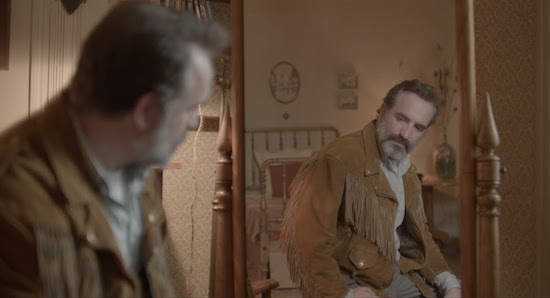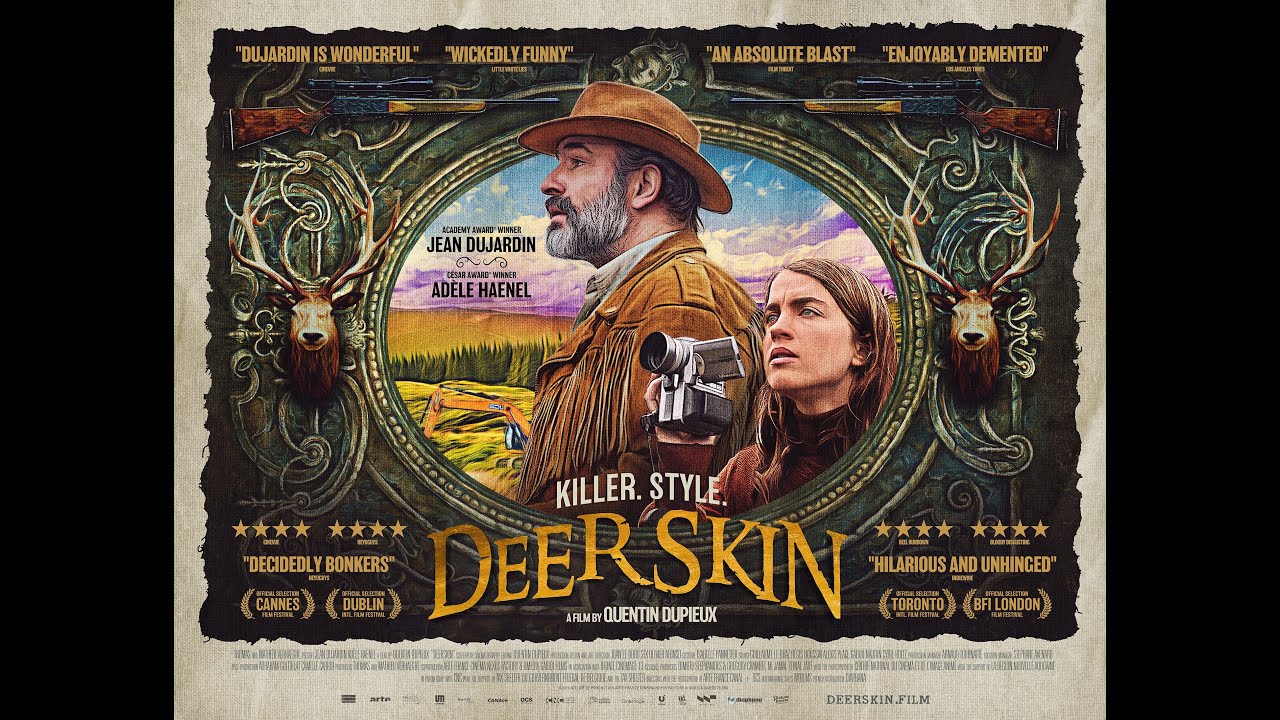In the beginning of Deerskin, a man struggles to flush an old green jacket down the toilet. Despite the water springing up and flooding the whole bathroom, the camera insists on showing how man’s boot keeps whacking the corduroy garment further down. Why? No reason. Indeed, the films of musician-turned-director Quentin Dupieux should be read through that particular lens of ‘no reason’. As an element of style, or an anti-philosophical stance, the filmmaker’s ‘no reason’ attitude makes use of seemingly random aggregates of images and symbols, glued together by a dream-like logic, that is ultimately, illogical. Life itself – and Dupieux insists on that – is full of meaningless, unscripted encounters, which, as a result, instills tons of existential dread than any other Forrest Gump-y comparison with “a box of chocolates”. The latest feature by the French writer-director, Deerskin, discovers life and filmmaking as interconnected practices, one leather garment at a time. It all starts when Georges (Jean Dujardin, restrained and surprisingly likeable) acquires an utterly expensive deerskin jacket which whispers to him plans of world domination and elimination of rival jackets, as well as their bearers.
Borderline (but not quite) violent, Deerskin unfolds as a mischievous comedy with a signature bleakness tinting both plot and dialogue. Dupieux tackles the serial killer subplot with impressive ease, which has to do with his natural inclination towards the absurd as a signifier of a parallel (and therefore, safer) world. By strategically avoiding character development, the film opens up space for comic relief and moulds its protagonist according to sketched-out social perceptions – white, male, middle-aged, rejected by his spouse. All the transient spaces, like the inside of Georges’ car, and the hotel room he rents for a month, are examples of what anthropologist Marc Augé termed “non-places” – ones less deserving of a symbolic status of a lived, inhabited place. Rather than suggest a rounded notion of dwelling, the film presents instead a series of vacuities, always playful with the idea of anonymity, loose identities and the art of self-invention. With ease, Georges presents himself as a film director only when promptly asked about his occupation by bartender Denise (Adèle Haenel). The audience sneers, since his relationship to filmmaking is the purely accidental result of a video recorder gift he receives as a bonus to his deerskin jacket.
What follows is a string of absurdist dialogues in which Georges convinces Denise (who has a passion for editing) to become his “creditor”, by which he means “editor”. A spur of the moment self-labeling acquires incantatory functions: he becomes a filmmaker. Or to be precise, he becomes one only with Denise’s support, both financial and emotional. As it so often happens, she’s working a hospitality job while her real passion lies elsewhere. At the same time, a man can easily claim a role (a directorial one, to no surprise) with such overblown confidence that its fictionality metamorphoses into a rightfully befitting one, to the point of evoking respect. Alluding to the underappreciated role of women in the film industry, especially that of women editors, Dupieux unravels a power dynamic that centers the film, rather subversively, around its female protagonist.
Haenel’s Denise is restless and excitable – quite the opposite of Georges’ hefty inhibition, and it seems only natural that Dupieux gifted her character with the love of movies. It shines through in the attention and tactility of her hands on each one of the tiny videotapes, or in the lightheartedness in her voice when she confesses to have put Pulp Fiction in chronological order, and that “it sucks”. Never dismissive and always enthusiastic, Denise quickly acquires a position of power. She is, unlike Georges, financially stable, and in a flash, she becomes editor and producer of the film, as well as its first critic. “The real subject of the film is the jacket. Or rather the fact that we all hide behind a shell to protect us from the outside world,” she says. In the same spell-binding fashion as the way she asked Georges about his occupation, it is Denise’s words that create a new reality, and from this moment on, this is what George’s film is about. Her words give meaning to a world of nonsense. She is, also, the female protagonist of Dupieux’s films with the most agency, surpassing the neurotic therapist wife of Reality’s filmmaker protagonist, the obsessive pizza place worker in Wrong, or the fatalistic, yet silent Roxane Mesquida (one of Catherine Breillat’s favourites), who played the killer car tire’s love interest in Rubber.
The visual style of Deerskin is subdued with a levelled rhythm of only a few longer takes in its slim runtime of 77 minutes, and its easy flow enables comedic episodes to bare their awkwardness so the discomfort can sink in. The film takes care of its audience by distributing its emotional intensity evenly, allowing the characters to be questioned or laughed at, and for the experiences of this particular – funny and outright weird – film world to mount and form an engulfing atmosphere. In this way, a murder sequence finds itself sandwiched between a shopping spree and a bank appointment. With a desaturated colour palette, the warmth of the scenes looks bleached, but never clinical. There is still some life there below the surface, struggling to escape – and that’s what gives the film a polished look, rather than a deadpan hopelessness. With its attention to floral patterns and textures, the film’s aesthetics pinpoint the significant details that often beautify the frame, with an emphasis on George’s velvety deerskin jacket with its well-defined tassels. The camera is often peeking through obstructions – bars, piles of books, cluttered desks, or curtains – and favours low angles so the characters look heftier, to an often comedic effect. In fact, by rarely aligning with the protagonists, the camera does more than just defy conventions. Dupieux is more interested in creating a gawky mood, in exploring the secret corners of life and cinema, so he often neglects the naturalistic “over the shoulder” point of view for a more peculiar and disorienting “at the elbow” look. Such an unnatural perspective, nevertheless, broadens the ethical horizon held by the film itself, as it opens up space for the viewer to doubt and even reassess the characters without directly aligning with their point of view.
“You don’t exist anymore,” Georges’ wife yells at him over the phone, echoing the film’s opening to Joe Dassin’s catchy chanson “Et si tu n’existais pas”, the only musical piece used in the film. The question of existence has actually never been a problematic one for Dupieux. His films are laden with characters, situations, and spoofs that produce a hypnagogic effect, but their reality status is never questioned. Deerskin represents the opposite of skepticism in relation to the uncanny, a film that gladly jumps on the bandwagon of unforseen ideas with an ease that resembles a dream. Without a doubt, Dupeiux’s influences are deeply rooted in surrealism, mainly Luis Buñuel’s French films, for example evoking the illogical dreamy setting of The Discreet Charm of the Bourgeoisie. Whenever Georges points the video recorder in front of his chest as a weapon, one might be tempted to bring in Peeping Tom as a comparison for a killer that films his murderous deeds. Or with a more recent reference, the film could make a stylish companion to Peter Strickland’s killer dress of his most recent feature, In Fabric. At the same time, such comparisons may be redundant, if the anti-logic of ‘no reason’ is observed. What is left if one can no longer operate on the intuitive principle of compare and contrast? Dupieux would say, life itself. Deerskin would second that, adding, “film itself”.
Deerskin is in UK cinemas now



